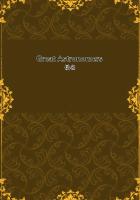Before I present the mutual relation between a lord and his vassal, I would call your attention to political anarchies ending in political degradation; to an unformed state of society; to semi-barbarism, with its characteristic vices of plunder, rapine, oppression, and injustice; to wild and violent passions, unchecked by law; to the absence of central power; to the reign of hard and martial nobles; to the miseries of the people, ground down, ignorant, and brutal; to rude agricultural life; to petty wars; to general ignorance, which kept society in darkness and gloom for a thousand years,--all growing out of the eclipse of the old civilization, so that the European nations began a new existence, and toiled in sorrow and fear, with few ameliorations: an iron age, yet an age which was not unfavorable for the development of new virtues and heroic qualities, under the influence of which society emerged from barbarism, with a new foundation for national greatness, and a new material for Christianity and art and literature and science to work upon.
Such was the state of society during the existence of feudal institutions,--a period of about five hundred years,--dating from the dismemberment of Charlemagne's empire to the fifteenth century.
The era of its greatest power was from the Norman conquest of England to the reign of Edward III. But there was a long and gloomy period before Feudalism ripened into an institution,--from the dissolution of the Roman Empire to the eighth and ninth centuries. I would assign this period as the darkest and the dreariest in the history of Europe since the Roman conquests, for this reason, that civilization perished without any one to chronicle the changes, or to take notice of the extinction.
From Charlemagne there had been, with the exception of brief intervals, the birth of new ideas and interests, the growth of a new civilization. Before his day there was a progressive decline.
Art, literature, science, alike faded away. There were no grand monuments erected, the voice of the poet was unheard in the universal wretchedness, the monks completed the destruction which the barbarians began. Why were libraries burned or destroyed? Why was classic literature utterly neglected? Why did no great scholars arise even in the Church? The new races looked in vain for benefactors. Even the souvenirs of the old Empire were lost.
Nearly all the records of ancient greatness perished. The old cities were levelled to the ground. Nothing was built but monasteries, and these were as gloomy as feudal castles at a later date. The churches were heavy and mournful. Good men hid themselves, trying to escape from the miserable world, and sang monotonous chants of death and the grave. Agriculture was at the lowest state, and hunting, piracy, and robbery were resorted to as a means of precarious existence. There was no commerce. The roads were invested with vagabonds and robbers. It was the era of universal pillage and destruction; nothing held sacred. Universal desolation filled the souls of men with despair. What state of society could be worse than that of England under the early Saxon kings? There were no dominant races and no central power. The countries of Europe relapsed into a sullen barbarism. I see no bright spot anywhere, not even in Italy, which was at this time the most overrun and the most mercilessly plundered of all the provinces of the fallen Empire. The old capital of the world was nearly depopulated. Nothing was spared of ancient art on which the barbarians could lay their hands, and nothing was valued.
This was the period of what writers call ALLODIAL tenure, in distinction from feudal. The allodialist owned indeed his lands, but they were subject to incessant depredations from wandering tribes of barbarians and from robbers. There was no encouragement to till the soil. There was no incentive to industry of any kind.
During a reign of universal lawlessness, what man would work except for a scanty and precarious support? His cattle might be driven away, his crops seized, his house plundered. It is hard to realize that our remote ancestors were mere barbarians, who by the force of numbers overran the world. They seem to have had but one class of virtues,--contempt of death, and the willing sacrifice of their lives in battle. The allodialist, however, was not a barbaric warrior or chieftain, but the despoiled owner of lands that his ancestors had once cultivated in peace and prosperity. He was the degenerate descendant of Celtic and Roman citizens, the victim of barbaric spoliations. His lands may have passed into the hands of the Gothic conquerors; but the Gothic or Burgundian or Frankish possessor of innumerable acres, once tilled by peaceful citizens, remained an allodial proprietor. Even he had no protection and no safety; for any new excursion of less fortunate barbarians would desolate his possessions and decimate his laborers. The small proprietor was especially subject to pillage and murder.
In the universal despair from this reign of anarchy and lawlessness, when there was no security to property and no redress of evils, the allodialist parted with his lands to some powerful chieftain, and obtained promise of protection. He even resigned the privilege of ******* to save his wretched life. He became a serf,--a semi-bondman, chained to the soil, but protected from outrage. Nothing but inconceivable miseries, which have not been painted by historians, can account for the almost simultaneous change in the ownership of land in all European countries. We can conceive of nothing but blank despair among the people who attempted to cultivate land. And there must have been the grossest ignorance and the lowest degradation when men were willing to submit to the curtailment of personal ******* and the loss of their lands, in order to find protectors.















